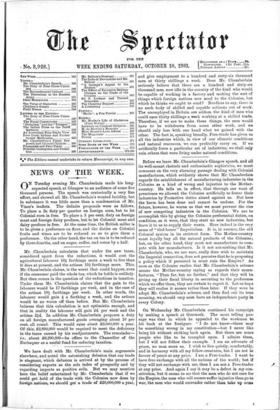We have dealt with Mr. Chamberlain's main arguments elsewhere, and
noted the astonishing delusion that our trade is stagnant, which delusion is arrived at by the process of considering exports as the sole index of prosperity and by regarding imports as positive evils. But we may mention here 'the belief entertained by Mr. Chamberlain that if we could get hold of the trade with the Colonies now done by foreign nations, we should get a trade of £26,000,000 a year,
and give employment to a hundred and sixty-six thousand men at thirty shillings a week. Does Mr. Chamberlain seriously believe that there are a hundred and sixty-six thousand men now idle in the country of the kind who would be capable of working in a factory and making the sort of things which foreign nations now send to the Colonies, but which he thinks we ought to send ? Needless to say, there is no such body of skilled and capable artisans out of work. The unemployed in Britain are seldom the kind of men who could earn thirty shillings a week working at a skilled trade. Therefore, if we are to make these things, the men would have to be withdrawn from some other work, and we should only lose • with one hand what we gained with the other. The fact is, speaking broadly, Free-trade has given us all the industries which, in view of our climatic conditions and natural resources, we can profitably carry on. If we artificially force a particular set of industries, we shall on'y ruin others that were living under natural conditions.














































